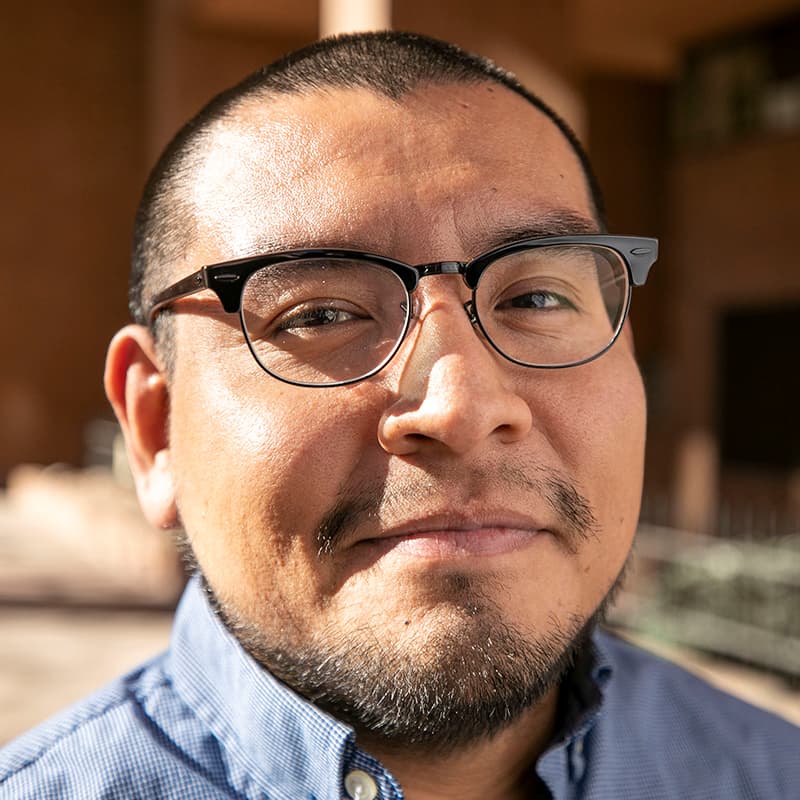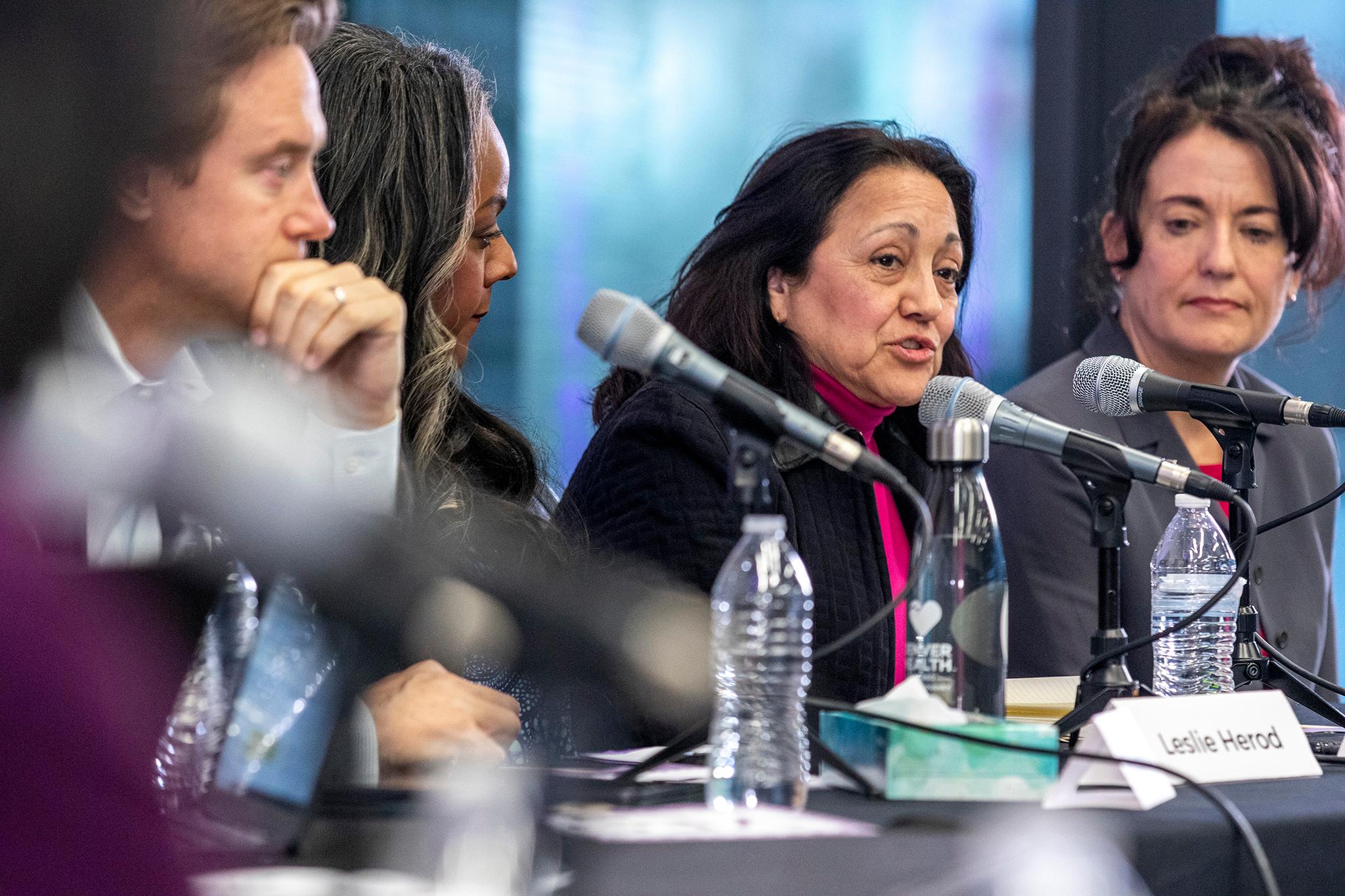As part of our 2023 voter guide, we asked each mayoral candidate on the ballot to fill out a questionnaire. You can read short biographies of each candidate and find their questionnaires here.
Please answer the following questions with a yes or no.
Should the conservation land easement on Park Hill Golf Course be lifted? Yes.
Assume the police force is fully staffed, should Denver hire more police officers? No.
On that note, would reducing the police budget to fund diversion programs and other potentially crime reducing initiatives ever be an option for your administration? No.
Should Denver plow streets after snow storms more often even if it means over budgeting for it? No.
There's a bill at the legislature that would allow a version of local rent control. If it became law, should Denver enact rent control measures? No.
Should Denver institute mandatory holds on people interacting with law enforcement who are in mental health or addiction crises? No.
If state law allowed them, should Denver have supervised drug use sites? Yes.
Is the mayor's office too powerful? Yes.
Does Denver need more bike lanes? Yes.
Does Denver need more parking lots? No.
Feel free to elaborate on these questions.
What are the biggest threats Denver faces in the next 30 years, and what will you do about them given that you could be mayor for 12 years?
With Denver's surging population, the lack of affordable housing and city infrastructure to accommodate this growth is the biggest threat our city will face in the next 30 years.
As mayor, I will lead more strategic investments in alternative housing, including modular homes, repurposing vacant units and/or commercial buildings, single room occupancy units (SROs), and accessory dwelling units (ADUs). I will also identify vacant public lands for manufactured housing. Manufactured housing can be produced at 40 percent the price of on-site new construction. These actions will be accompanied by revising Denver's permitting processes to remove barriers, improve efficiency, and prioritize projects that add to affordable housing stock across income ranges.
With our city infrastructure struggling to accommodate the demand presented by our city's growth, I will lead the adoption of my Infrastructure Master Plan, which will increase visibility into our city's infrastructure capacity.
What do you admire about Mayor Michael Hancock's administration? What would you improve on?
Given the economic hardship that far too many Denverites are experiencing, I admire Mayor Hancock's willingness to come to the table and support legislation that seeks to better support hard working people through the passage of A Livable Wage For Denver. Given my record of standing up to special interests and consistently standing by working people, this was an action that made me extremely proud of the current mayor.
As for areas to improve upon, with Denver receiving roughly $77 million for housing programs from the American Rescue Plan Act, our city should be able to show better results for those in need of an affordable place to call home. We haven't yielded the results we could have with this funding under his leadership.
Due to Denver's focus on the lowest-income populations, we also need to focus on our "missing middle," and provide rental and affordable for-sale housing solutions for our firefighters, teachers, nurses, and bus drivers.
What steps would your administration take to make Denver more affordable?
Our city's vibrancy, ability to attract new residents and businesses, and economic vitality depends on the ability of working people to afford to live here. Denverites are spending too large of a portion of their incomes on housing, we need to make housing more affordable - with better access to bus and rail connections.
To address our crisis of unaffordable housing, a comprehensive approach is required, including job connection, public transportation, childcare, and much more.
The Expanding Housing Affordability program created by City Council begins to address expediting permits for affordable units, but more work is required to fix Denver's broken permitting process so more affordable housing and other development projects can be developed more quickly.
As mentioned earlier, we need to invest more in alternative housing and identify vacant public lands for manufactured housing.
Sweeps or no sweeps? You can add some nuance here, but you must answer "I would continue the sweeps" or "I would end the sweeps."
It is inhumane to let people suffer and die on our streets. With the number of shelters in our city, Denver is not lacking for meeting emergency housing. It is critical that we address the public health hazard of encampments, but this is only the first step in solving homelessness. The process, which requires advanced notice, must connect our diverse unhoused population to local and regional resources, including mental health services, treatment beds, training, a pathway to employment which supports the rebuilding of self-worth and purpose. I would continue the sweeps, with a concentrated focus on getting people connected to local and regional resources.
Permitting wait times in Denver have increased significantly, sometimes slowing down how fast housing can be built. What do you think is the problem and how would you fix that?
I will have city workers return back to work and plan to revisit whether the permit office is located in the right agency to ensure that projects are being built faster and more efficiently. Small home projects are taking a ridiculous amount of time to obtain permits as well.
Further, I intend to adequately staff the processing of small residential and commercial projects - different from how we staff and review large scale projects. This will assist in getting permits expedited. This will result in staffing changes on an interim basis while concurrently reviewing the Permit Office's permanent location with external and internal stakeholder input.
What are your thoughts on converting downtown empty office spaces into residences?
I am excited by the potential presented by repurposing vacant units into housing for Denver residents. We are at an "all options on the table" moment when it comes to developing a housing supply that meets our demand, and this is a creative step to meet this demand while activating our downtown. This presumes we have addressed our crime and safety issues downtown, and I will ensure the safety of residents by meeting fire code standards.
Black-owned businesses like Coffee at the Point and Wah Gwaan Brewing Company have been shutting down. Should the city intervene to preserve Black entrepreneurship, and if so, how?
Yes! We need to better support our small, local, and minority-owned businesses. Maintaining small businesses and neighborhood businesses is crucial to the character of our neighborhoods. I'd take a balanced approach in ensuring that the Herman Malone Fund, along with other Denver Economic Development Opportunity (DEDO) funding, provides innovative resources for minority-owned businesses to leverage, so they could make investments in new property and equipment while hiring new staff, leading to jobs, economic growth, and tax revenues.
How do you feel about land acknowledgements?
Land acknowledgements are an important opportunity to understand our place in history and honor those whose land we are able to live, work, and socialize on.
What are your thoughts on a flavored tobacco ban?
I supported the ban on flavored tobacco in 2021 and stand by that vote. We know tobacco is a health hazard and that these flavored variants target our youth to become lifelong customers. I was, and still am, adamantly opposed to Mayor Hancock's veto of the flavored tobacco ban because of the harm it will cause to our youth. I would move to bring it back, unless the Colorado legislature passes a statewide ban.
Describe specifically how your office will demonstrate transparency?
Upholding government transparency is an obligation of the city; it is a management practice that leads to better results and accountability within any organization.
I have demonstrated my commitment to transparency as an original co-sponsor of the ordinance that created the Public Safety Review Commission which addresses police and sheriff accountability for their actions.
As Denver's next mayor, the public can expect that I will instill a culture of transparency that includes how my agencies will continue the race, social justice and inclusion (RSJI) into the budget process that I helped the Hancock administration adopt. I will continue to place the city budget on-line for the public to review how we are spending their hard-earned taxpayer money.
When's the last time you rode RTD?
It's been close to a year. I rode the A-Line to DIA.
Vision Zero, Denver's initiative to eliminate traffic deaths, could be going better. What would you do to improve that?
I would institute a safety education campaign, with an emphasis on HIN (High Injury Networks). The city received $1.5 million for these efforts between 2018 - 2019. I would extend funding for this program so we can coordinate local, city, and statewide messaging for the highest level of impact while educating the public on the detriments of speeding, distracted driving, and driving under the influence.
Improving Vision Zero starts with partnerships and targeted efforts. I will partner with the Department of Transportation, transportation organizations, and pedestrian safety advocates to address the challenges accompanying our historically high pedestrian fatalities. I will assess how decisions are being made by DOTI and elevate the role of the DOTI Advisory Board.
Concurrently, my office will ensure the City-School Coordinating Committee plays a key role in fulfilling the Safe Routes to School program to keep our children, parents, and caregivers safe from traffic.
Education around transit safety will need to be an ongoing effort underpinning these and other strategies. I plan to continue the investments allocated towards Vision Zero's education campaigns so we can stop preventable injuries and deaths.
The EPA has declared Denver a "severe" violator of federal ozone standards. What actions would you take to reduce ozone precursor emissions within the city?
I want to be the mayor that moves Denver to work with neighboring jurisdictions to bring us into compliance with the Clean Air Act. Our degraded air quality has enormous impacts on our quality of life, and is creating a public health crisis for our most vulnerable community members - especially those located in industrial areas and highway corridors.
With transportation representing nearly 30 percent of carbon emissions in Denver, I would prioritize building out hydrogen and electric vehicle charging infrastructure for city fleet vehicles and commuters, provide more incentives for alternative modes of transportation such as E-Bikes, and set ambitious goals with the Denver Climate Action Office to surpass our greenhouse gas emissions reduction targets within my first term.
Further, I will continue the city's efforts to prioritize housing development near public transportation hubs, commercial space, and transit corridors. Doing so will close the gap on first-mile and last-mile connections, reduce commutes, and decrease our city's carbon footprint.
What's the worst intersection in Denver?
Approximately three years ago, I secured funding through our budget process to address pedestrian accidents adjacent to Colfax where pedestrian fatalities at 14th and Federal Boulevard have occurred, and continue to occur, because of bus stops on both sides of Federal and a RTD train connection that brings a lot of foot traffic to this area. To date, no improvements to this intersection have occurred. As mayor, I'd prioritize creating safer outcomes for those along this intersection and other unsafe intersections throughout the city.
Need more help voting? Check out the rest of our voter guide here.














